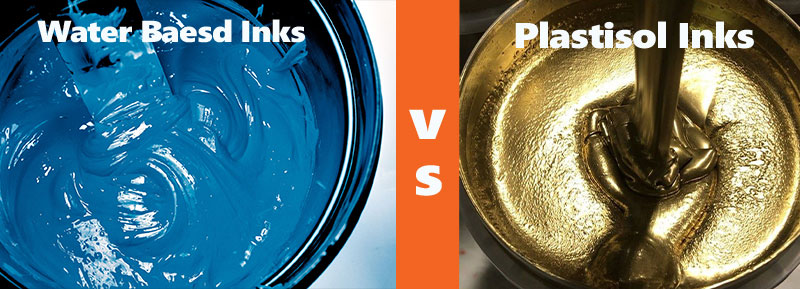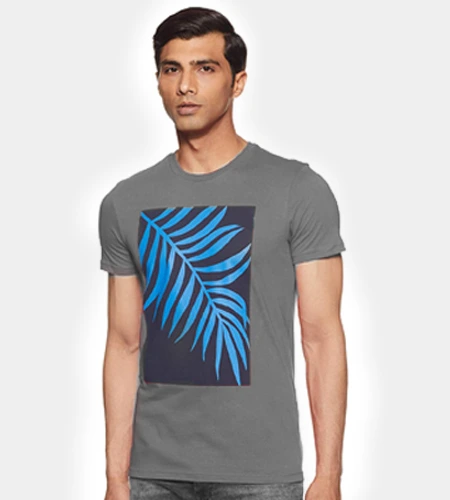What are the types of inks you use while screen printing on T-Shirts?
There are basically 2 types of screen printing inks for T-Shirts:
- Waterbased inks and discharge inks
- Non-PVC and Plastisol
Waterbased inks and Discharge ink Printing on T-Shirts:
- What are Waterbased inks: The simple answer is that water based ink is any ink which uses water as a solvent base to carry the pigment. Waterbased inks contain a pigment held in a water based solution of varying viscosity which dyes the t-shirt to the desired colour.
- What are discharge inks: Discharge ink is a type of waterbased inks. Discharge inks have a bleaching effect where the removed the dye from the top layer of the t-shirt fabric and optionally replaces it with another colour. The discharge inks, however, require a very high temperature to activate. As it takes a long time and a very high temperature for the discharge inks to activate, these require a minimum run of 100 t-shirts to print.
The advantages of waterbased printing on T-Shirts:
- The t-shirt print will have a soft feel
- The T-Shirt print will be breathable
- This printing technique is environment friendly as no chemicals are used to clean after printing and the inks do not contain plastic unlike Plastisol
- Finer designs on t-shirts come out better with waterbased inks as they sit deeper in the fabric
- The t-shirt print is part of the fabric, so, there is no heavy print on the t-shirt
- You can iron over the t-shirt print without a problem
The disadvantages of waterbased printing on T-Shirts:
- Designs print better over lighter colour t-shirts
- Only works on cotton t-shirts
- This printing technique is environment friendly as no chemicals are used to clean after printing and the inks do not contain plastic unlike Plastisol
- Finer designs on t-shirts come out better with waterbased inks as they sit deeper in the fabric
- The t-shirt print is part of the fabric, so, there is no heavy print on the t-shirt
- You can iron over the t-shirt print without a problem
- Colour matching on the print on t-shirt is very difficult as it depends on several factors like the fabric, temperature, viscosity etc
Plastisol and Non PVC Plastisol ink Printing on T-Shirts:
- What are Plastisol inks: Plastisol inks, or traditional inks, are solid inks which are applied on the surface of the t-shirt. They do not dry on their own and a high temperature has to be applied for them to 'set' on the t-shirt. They are also commonly known as 'rubber' print. It is the only solution for printing on t-shirts where discharge print cannot be used.
- What are Non PVC Plastisol inks: In non PVC inks, plastic is replaced with acrylic, a much safer and environment friendly plastic than PVC. These also meet all european and US norms of print safety.
The advantages of plastisol printing on T-Shirts:
- Can you be used to print on t-shirts of any fabric
- The T-Shirt print will be breathable
- Neon effects, glow in the dark and other special effects printed on t-shirts are plastisol prints
- Allows true colour matching, regardless of fabric colour or type
The disadvantages of waterbased printing on T-Shirts:
- Print appears like a layer on the t-shirt
- Makes the garment heavier which might make it unsuitable for sports t-shirts and other specific uses
- Finer designs on t-shirts do not come out sharp because they run thicker
- The t-shirt print is not part of the fabric, so, there is no heavy feel of the print on the t-shirt
- You cannot iron directly over the t-shirt print at high temperatures
You can learn all about and the advantages and disadvantages of Screen printing vs Direct to Garment Printing and then decide which printing technique you wish to choose for your t-shirt design.







































